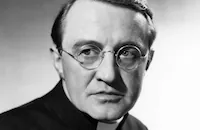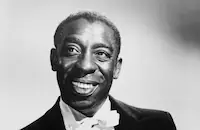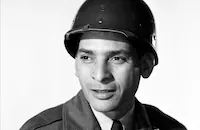Apache Drums
Cast & Crew
Hugo Fregonese
Stephen Mcnally
Coleen Gray
Willard Parker
Arthur Shields
James Griffith
Film Details
Technical Specs

Synopsis
In 1880, in the desert mining town of Spanish Boot, New Mexico, gambler Sam Leeds shoots and kills another man, claiming that he acted in self-defense. Mayor Joe Madden, who is also the town's blacksmith, orders the gambler to leave because he no longer wants men like Sam in his growing town. Reverend Griffen, a Welsh minister, convinces Madden that the dance hall should also be closed down. Happy to leave Spanish Boot, Betty Careless, the dance hall's earthy proprietor, sells her property and prepares her black assistant Jehu and her various female employees to catch the noon stagecoach to Silver Springs. Before he leaves town, Sam asks his sweetheart, Sally Barr, to go with him. Torn between her love for Sam and her desire for an honest and upright husband, Sally reluctantly decides to remain in Spanish Boot. Sam suspects that Madden plans to win Sally for himself. Along the trail to the next town, Sam discovers that the stagecoach has been attacked and the dance hall employees brutally killed. Just before he dies, Jehu tells Sam that hundreds of Mescalero Apaches have reappeared from across the border and begs him to warn the town. Frightened, Sam returns to Spanish Boot, but realizes to his horror that because of their distrust of him, neither Madden nor any of the other citizens believe his story. However, when a stagecoach full of arrows arrives, the citizens begin to worry and send a young man to the nearest fort for help. The next morning, a local resident named Chacho discovers the young man's mutilated body in the well, and the citizens, afraid to drink the tainted well water, wonder if they will all die of thirst. Their concern does not extend, however, to Pedro-Peter, a cavalry scout who, because he is an Apache, is forbidden by law to drink liquor. As the townspeople quaff beers in the local tavern, Sam enters and buys Pedro-Peter a beer. When Griffen reminds Sam of the law, Sam decides that because Madden refuses to act, he himself will lead a party of men to fetch water from the river. On the way home, the party is attacked, and Sam and the minister try to hold off the Indians while the others escape. When Sam's bullet strikes a chief, the Apaches withdraw, their voices joined in a keening that echoes across the desert. Trudging back to town, Sam and Reverend Griffen see horses approaching. Believing they are about to die, Sam confesses that he risked the lives of the other men in the party merely to shame Madden. The horsemen are actually cavalrymen, but after Lt. Glidden congratulates Sam on having shot Chief Victorio, an Apache "prophet, priest, and war chief all in one," Madden arrests him for having given liquor to an Indian. Back in town, Sam bids Sally farewell one more time, but just then, a large party of Apaches attacks Spanish Boot. The townspeople take refuge inside the church, but Glidden points out that the Indians can easily complete their attack by scaling the church's many elevated windows. After a long wait, the terrified settlers hear the Apaches approaching with drums, flutes and song. Glidden explains that the Mescaleros are preparing to kill by drinking a potent whiskey, and that when the song changes, braves will jump through the windows and attack. Griffen maintains that the Indians are heathens, but Glidden argues that the Apaches are a dying people and that Chief Victorio gave them hope. The Mescaleros continue a cycle of attacking and singing, while the miners inside counter with their own Welsh fighting song. Sam fights heroically and is reconciled with Sally. To buy time, Madden claims he is a doctor and attempts to treat Chief Victorio, but when Victorio finally dies of Sam's gunshot wound, Madden is killed, and the Indians set fire to the church's wooden door. As the Apaches are about to enter the church, the cavalry arrives, and the townspeople are saved.

Director
Hugo Fregonese
Cast

Stephen Mcnally

Coleen Gray

Willard Parker

Arthur Shields

James Griffith
Armando Silvestre
Georgia Backus

Clarence Muse
Ruthelma Stevens

James Best
Chinto Guzman
Ray Bennett
Irving Kane
Steve Dunhill
Monte Montague
John War Eagle

Maurice Jara
George Lynn
James Parnell
Ian Murray
Josephine Parra
Clem Fuller
Sheb Wooley
Chuck Hayward
Dan Poore
Hal Bokor
Alex Sharp
Stanley Fraser
Harte Wayne
Buddy Roosevelt
Cliff Parkinson
Ann Lovelady

Gertrude Astor
Joy Hallward
Copper Johnson
Herberta Williams
Alan Dinehart Iii

Donna Corcoran
Sherry Jackson
Crew
Glenn E. Anderson
Charles P. Boyle
Harry Brown
Leslie I. Carey
Milton Carruth
David Chandler
Robert Clatworthy
A. Roland Fields
William Fritzsche
Russell A. Gausman
Bernard Herzbrun
Bill Holland
Val Lewton
Irvin Mack
Hans J. Salter
Joan St. Oegger
Dewey Starkey
Bill Thomas
Bud Westmore
Dr. Chris Willowbird

Film Details
Technical Specs

Quotes
If I live to bury Joe Madden, I'll say only four words over his grave: This was a man.- Rev. Griffin
I got a knack at healing. I know something about it.- Joe Madden
Look, you're a great horse doctor, Joe, and...- Sam Leeds
There isn't much difference between a horse and a human. At least I know how to get started. You wouldn't even know that.- Joe Madden
Do you realize that men have been given as much as twenty years in federal prison for giving liquor to an Indian?- Lt. Glidden
You see they don't drink to get drunk. Their drinking is like praying. And then they kill.- Lt. Glidden
No bullets, no protection... not even anything worth taking a last look at.- Sam Leeds
It is God's earth, man. You wouldn't reject it in the hour of your death.- Reverend Griffin
Trivia
Notes
The working title of this film was War Dance. Onscreen credits note that Harry Brown's story was titled "Stand at Spanish Boot." Although reviews refer to Brown's story as a novel, no publication information has been found to support that claim. An offscreen narrator, presumably a Mescalero Apache, states as the film opens that his people can go neither north nor south: "The hunger wolf chews on our strengths. Soon the warriors will be too weak to fight. Then the white man will thrust us away from the earth, and only the empty sky will know the voices of the Mescalero." This is followed by an onscreen statement: "A hungry people rose to fight. Their fury fell upon settled places where peaceful Americans carried on trade and Welsh miners dug for silver. One of these places was the town of Spanish Boot." The historical Victorio was a Chiricahua Apache leader who led his people from the hated San Carlos Reservation to their homeland, the Black Mountains.
Location shooting was done in Apple Valley and the Mojave Desert in California, according to Hollywood Reporter news items and materials contained in the MPAA/PCA file on the film in the AMPAS Library. According to the pressbook for the film, Dr. Chris Willowbird, a "noted authority on Indian lore," supervised the recording of the authentic Apache music for the soundtrack. An orchestra of twenty Apache Indians was used for the recording, which was highlighted by an Apache religious chant sung in ceremonial preparation for going into battle. The soundtrack also includes Apache drinking songs and "several warpath numbers." The Los Angeles Examiner reviewer commented that the "Indian drum work, tribal music and primitive customs are particularly well handled in this film, and the sets for once seem real." The Los Angeles Daily News reviewer remarked, "The picture is also notable for portraying an Indian as an honorable person-not just as a man who says 'Ugh!' to your face and then scalps you from the rear."
Apache Drums marked Val Lewton's last film and his only Technicolor production. Lewton died of a heart attack on March 14, 1951; the film was released after his death. In 1956, the picture was reissued by Realart.












